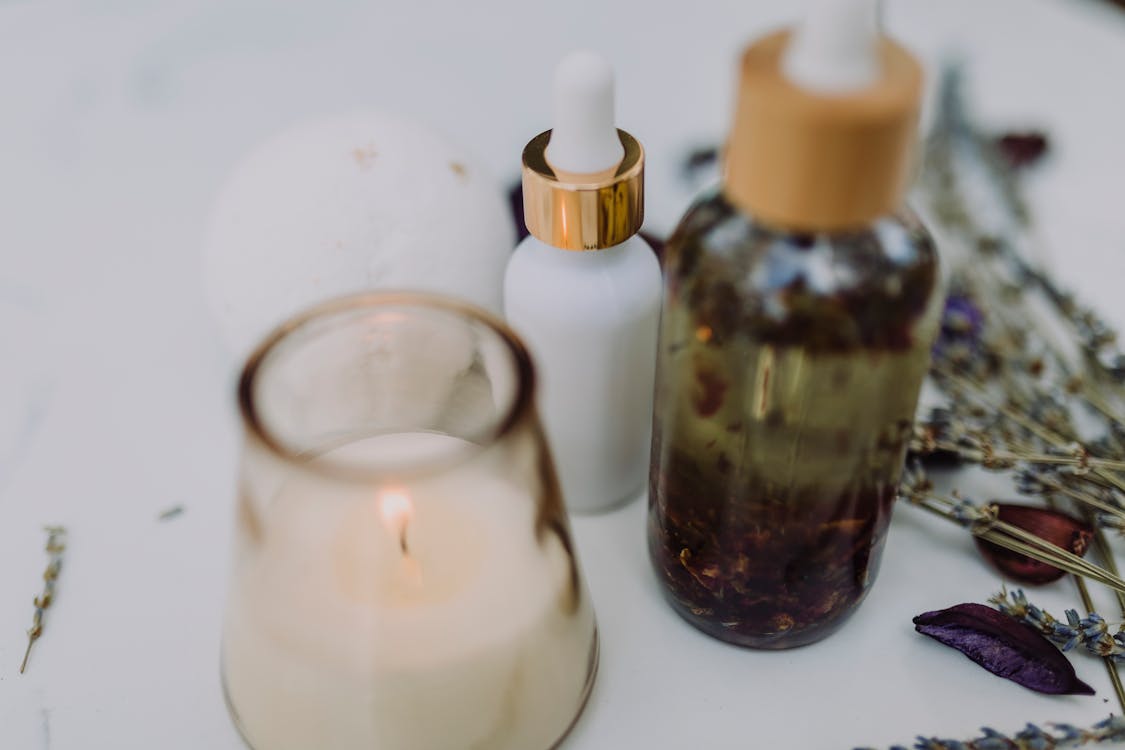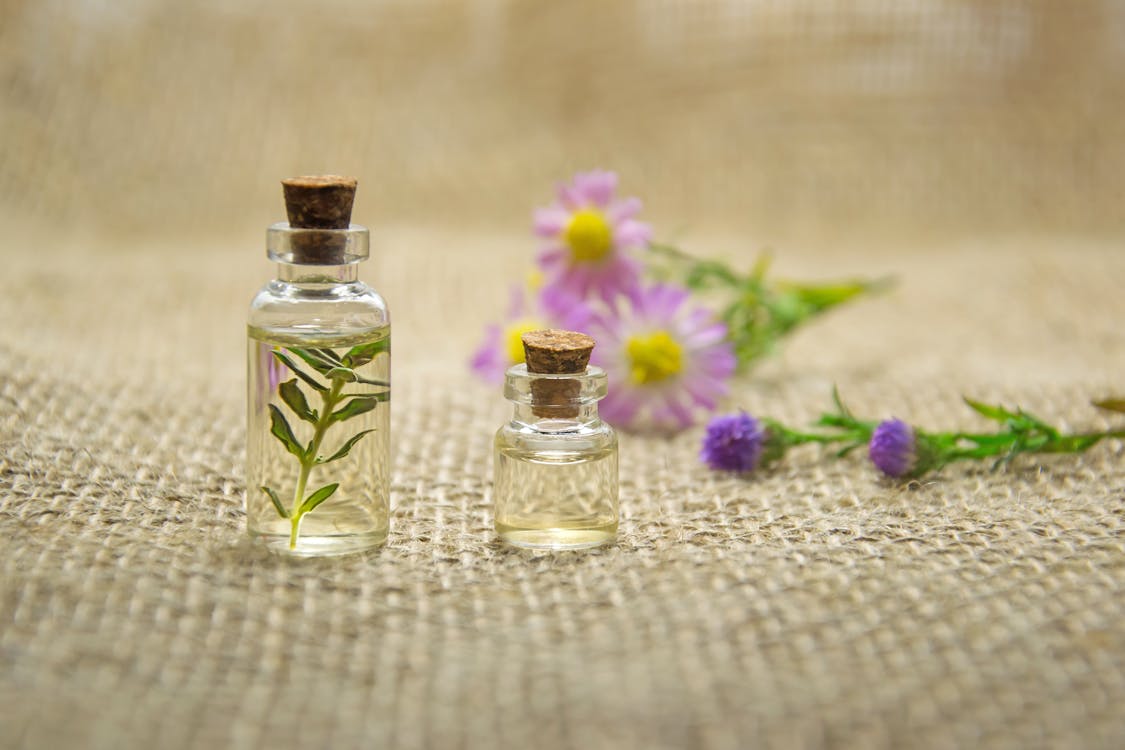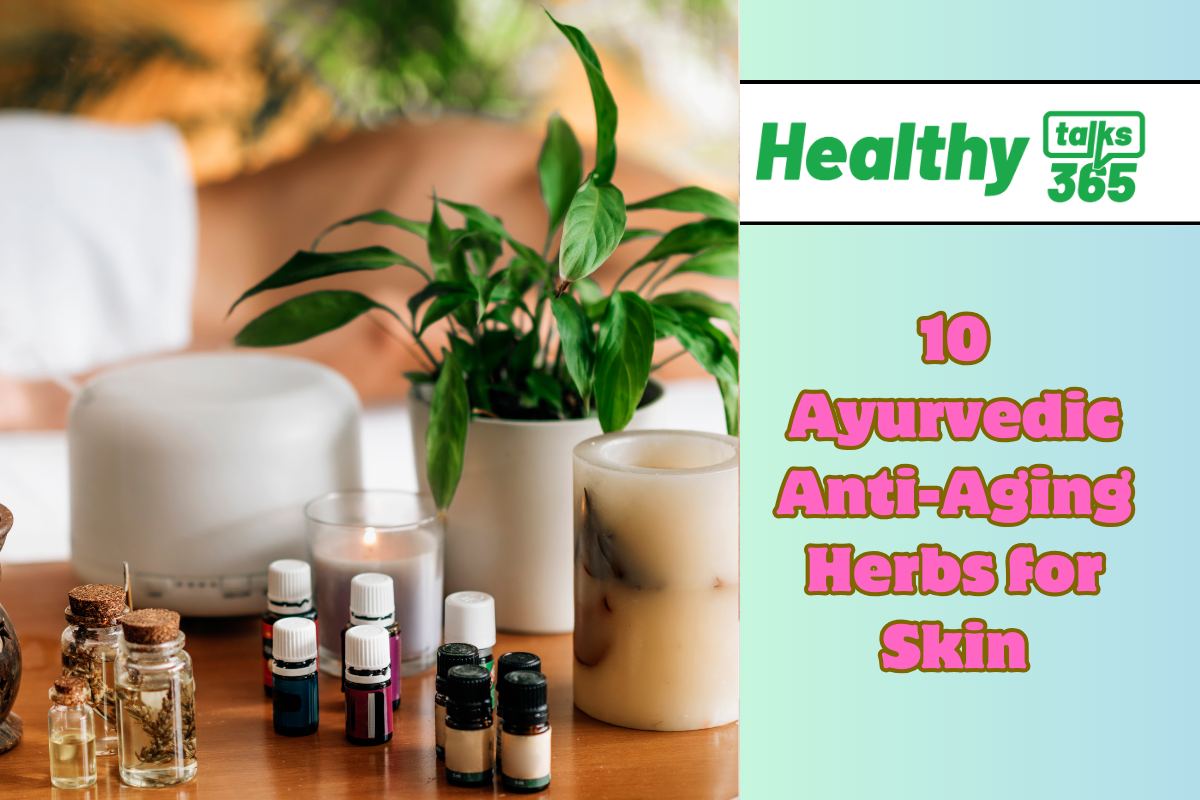10 Ayurvedic Anti-Aging Herbs for Skin
Ashwagandha
Ashwagandha, also known as Indian ginseng or winter cherry, is a powerful adaptogenic herb in Ayurveda known for its rejuvenating properties. It helps combat stress and promotes overall well-being, which indirectly supports skin health. Ashwagandha’s antioxidant properties help protect the skin from free radical damage, reducing signs of aging like wrinkles and fine lines. Its anti-inflammatory effects may also soothe irritated skin, promoting a clearer complexion. Additionally, ashwagandha supports collagen production, enhancing skin elasticity and firmness. Regular consumption or topical application of ashwagandha can contribute to youthful, radiant skin. Renowned in Ayurvedic medicine as a potent adaptogenic herb, offers multifaceted benefits for overall well-being, which inherently supports skin health. Its adaptogenic properties help the body cope with stress by regulating the adrenal glands and balancing cortisol levels. This stress-reducing effect indirectly benefits the skin, as chronic stress can contribute to skin issues such as acne, eczema, and premature aging. In addition to its benefits for skin health, ashwagandha supports physical health by enhancing energy levels, stamina, and overall vitality. It aids in improving muscle strength and recovery, making it popular among athletes and fitness enthusiasts.

Turmeric
Turmeric, often referred to as the “golden spice,” is renowned for its anti-inflammatory and antioxidant properties. Curcumin, its active compound, helps protect the skin by neutralizing free radicals and reducing oxidative stress. This can prevent premature aging signs such as wrinkles and pigmentation. Turmeric also supports skin healing and regeneration, making it effective against scars and blemishes. Its antimicrobial properties may help combat acne and other skin infections. Regular use of turmeric, both internally and externally, can promote a glowing complexion and overall skin health.
Read Also:
Focus While Studying: 10 Proven Methods
Gotu kola
Gotu kola, also known as Centella asiatica, is prized in Ayurveda for its rejuvenating properties. It promotes collagen synthesis, enhancing skin elasticity and reducing the appearance of wrinkles. Gotu kola’s antioxidant properties protect the skin from free radicals, preventing premature aging. It also has anti-inflammatory effects that can soothe irritated skin conditions like eczema and psoriasis. Gotu kola is often used topically in creams and ointments to promote wound healing and improve skin texture. Regular consumption of gotu kola or its topical application can contribute to healthier, youthful-looking skin.
Neem
Neem, known as the “village pharmacy” in India, is a potent herb with antibacterial, antifungal, and anti-inflammatory properties. It helps purify the blood and detoxify the body, which reflects positively on skin health. Neem’s antioxidant properties protect the skin from environmental damage and free radicals, delaying signs of aging. Its antimicrobial effects make it effective against acne and other skin infections. Neem oil or neem leaves paste is commonly used in skincare routines to treat acne, scars, and pigmentation. Regular use of neem can promote clear, blemish-free skin and maintain its youthful appearance. Neem’s antioxidant properties protect the skin from environmental pollutants and UV damage, which helps prevent premature aging signs like wrinkles and age spots. Moreover, its antimicrobial effects make neem particularly effective against acne-causing bacteria, reducing inflammation and promoting faster healing of acne lesions. Regular use of neem oil or neem leaf paste in skincare routines helps combat acne, scars, and pigmentation issues, promoting clear and blemish-free skin. Neem’s comprehensive skincare benefits make it a staple in natural skincare remedies aimed at maintaining youthful and healthy skin.
Brahmi
Brahmi, also known as Bacopa monnieri, is an adaptogenic herb known for its cognitive benefits in Ayurveda. It also offers remarkable benefits for skin health. Brahmi enhances collagen production, improving skin elasticity and firmness. Its antioxidant properties protect the skin from free radicals and oxidative stress, reducing wrinkles and fine lines. Brahmi’s anti-inflammatory effects can soothe irritated skin conditions like eczema and dermatitis. It also supports skin regeneration and healing, promoting a clearer complexion. Brahmi oil or Brahmi extracts are used in skincare products to rejuvenate and nourish the skin. Regular use of Brahmi can help maintain youthful, radiant skin.

Amla
Amla, also known as Indian gooseberry, is one of the richest sources of vitamin C and antioxidants. It protects the skin from oxidative stress, preventing premature aging signs such as wrinkles and fine lines. Amla boosts collagen production, enhancing skin elasticity and firmness. Its astringent properties help tighten the skin and reduce the appearance of pores. Amla also supports skin healing and regeneration, making it effective against scars and blemishes. Regular consumption of amla juice or its application in face masks can promote a brighter, healthier complexion. Amla, revered as the powerhouse of vitamin C and antioxidants in Ayurveda, offers extensive benefits for skin health, primarily through its potent antioxidant properties. These antioxidants protect the skin from oxidative stress caused by free radicals, thereby preventing premature aging signs such as wrinkles and fine lines. Amla’s high vitamin C content boosts collagen production, crucial for maintaining skin elasticity and firmness.
Read Also:
11 Best Ways to Improve Your Digestion
Shatavari
Shatavari, known as the “queen of herbs” in Ayurveda, is renowned for its rejuvenating and nourishing properties. It supports hormonal balance, which can have a positive impact on skin health. Shatavari’s antioxidant properties protect the skin from free radicals and oxidative stress, reducing signs of aging like wrinkles and fine lines. It also supports collagen production, enhancing skin elasticity and firmness. Shatavari’s anti-inflammatory effects can soothe irritated skin conditions like acne and eczema. Regular consumption of shatavari or its topical application can promote clear, glowing skin and maintain its youthful appearance. Shatavari offers emollient properties that deeply moisturize and nourish the skin, making it particularly beneficial for dry Vata and combination Pitta type skin. It helps in restoring hydration levels, reducing dryness, and improving skin texture. Additionally, Shatavari’s moisturizing effects support a healthy skin barrier function, enhancing resilience against environmental stressors and maintaining a balanced complexion. Regular use of Shatavari in skincare routines can promote soft, supple skin with a radiant glow.
Tulsi (Holy basil)
Tulsi, or holy basil, is considered sacred in Ayurveda for its healing properties. It has powerful antioxidant, antimicrobial, and anti-inflammatory effects that benefit skin health. Tulsi protects the skin from environmental damage and free radicals, preventing premature aging signs like wrinkles and dark spots. Its antimicrobial properties help combat acne-causing bacteria and other skin infections. Tulsi’s anti-inflammatory effects can soothe irritated skin conditions like acne and eczema. Regular consumption of tulsi tea or its use in skincare products can promote clearer, healthier-looking skin.
Manjistha
Manjistha, also known as Indian madder, is valued in Ayurveda for its detoxifying and blood-purifying properties. It supports liver function, which can positively impact skin health by eliminating toxins from the body. Manjistha’s antioxidant properties protect the skin from free radicals and oxidative stress, reducing signs of aging like wrinkles and fine lines. It also supports collagen production, enhancing skin elasticity and firmness. Manjistha’s anti-inflammatory effects can soothe irritated skin conditions like acne and eczema. Regular consumption of manjistha or its topical application can promote clearer, healthier-looking skin. Manjistha’s ability to purify the blood helps reduce pimples by eliminating toxins and impurities that can contribute to skin inflammation. Its detoxifying properties support a clearer complexion by promoting the elimination of acne-causing bacteria and excess oils from the skin. Additionally, Manjistha’s anti-inflammatory effects help calm existing breakouts, making it beneficial for managing acne-prone skin. Regular use of Manjistha internally or topically can contribute to smoother and healthier-looking skin over time.

Guduchi
Guduchi, also known as Tinospora cordifolia, is a powerful herb known for its immune-boosting and rejuvenating properties in Ayurveda. It supports overall health and well-being, which can reflect positively on skin health. Guduchi’s antioxidant properties protect the skin from free radicals and oxidative stress, reducing signs of aging like wrinkles and fine lines. It also supports collagen production, enhancing skin elasticity and firmness. Guduchi’s anti-inflammatory effects can soothe irritated skin conditions like acne and eczema. Regular consumption of guduchi or its topical application can promote clearer, healthier-looking skin. Guduchi, also known as Tinospora cordifolia, is a potent herb in Ayurveda celebrated for its immune-boosting and rejuvenating properties, which extend to skin health. Its antioxidant properties protect the skin from oxidative stress and free radicals, preventing premature aging signs like wrinkles and fine lines. By supporting collagen production, guduchi enhances skin elasticity and firmness, contributing to a more youthful appearance.
Read Also:
Pregnancy: Signs, Symptoms, Overview, Health Tips You Should Know




